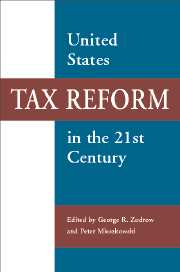Book contents
- Frontmatter
- Contents
- List of Contributors
- Preface
- 1 Introduction: The Fundamental Question in Fundamental Tax Reform
- 2 Behavioral Responses to a Consumption Tax
- 3 The Economic Impact of Fundamental Tax Reform
- 4 Capital Income Taxation in Tax Reform: Implications for Analysis of Distribution and Efficiency
- 5 International Aspects of Fundamental Tax Reform
- 6 Distributive Analysis of Fundamental Tax Reform
- 7 The Role of Administrative Issues in Tax Reform: Simplicity, Compliance, and Administration
- 8 Evaluating the National Retail Sales Tax from a VAT Perspective
- 9 Transitional Issues in the Implementation of a Flat Tax or a National Retail Sales Tax
- 10 Historical and Contemporary Debate on Consumption Taxes
- 11 The Politics and Ideology of Fundamental Tax Reform
- Bibliography
- Index
11 - The Politics and Ideology of Fundamental Tax Reform
Published online by Cambridge University Press: 23 October 2009
- Frontmatter
- Contents
- List of Contributors
- Preface
- 1 Introduction: The Fundamental Question in Fundamental Tax Reform
- 2 Behavioral Responses to a Consumption Tax
- 3 The Economic Impact of Fundamental Tax Reform
- 4 Capital Income Taxation in Tax Reform: Implications for Analysis of Distribution and Efficiency
- 5 International Aspects of Fundamental Tax Reform
- 6 Distributive Analysis of Fundamental Tax Reform
- 7 The Role of Administrative Issues in Tax Reform: Simplicity, Compliance, and Administration
- 8 Evaluating the National Retail Sales Tax from a VAT Perspective
- 9 Transitional Issues in the Implementation of a Flat Tax or a National Retail Sales Tax
- 10 Historical and Contemporary Debate on Consumption Taxes
- 11 The Politics and Ideology of Fundamental Tax Reform
- Bibliography
- Index
Summary
The recent public saliency of fundamental tax reform – specifically a shift to a single-rate consumption-based form of federal taxation – reflects the confluence of three important contemporary trends. The first is the ideological ascendancy of conservatism, with its long-standing suspicion of activist government. The second is the political rise of the national Republican Party, fully competitive with the Democrats on both the congressional and presidential levels. The third is a growing body of theoretical and empirical research critical of the income tax and supportive of consumption-based taxation.
At first glance, this confluence would appear to put fundamental tax reform within reach. But while the climate for reform may have improved markedly, serious and perhaps insurmountable obstacles remain. At the ideological level, fundamental tax reform risks fracturing the coalition between economic and social conservatives that has created the right's current dominance. As reform moves from vague campaign promise to comprehensive legislative proposal, moreover, it may place the Republican Party in conflict with some of its most important constituencies. Finally, the economic literature on fundamental tax reform – though extensive, sophisticated and suggestive – remains inconclusive on a number of key issues.
Fundamental tax reform entails significant political and ideological risks for those promoting it. Given the expectations raised by the measures currently under discussion, the potential costs of failure are high. Prospects for reform are, on balance, poor.
- Type
- Chapter
- Information
- United States Tax Reform in the 21st Century , pp. 294 - 310Publisher: Cambridge University PressPrint publication year: 2002



